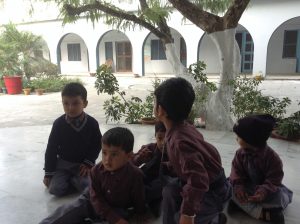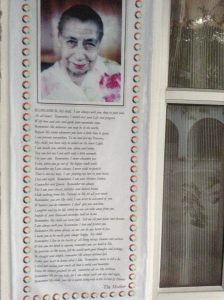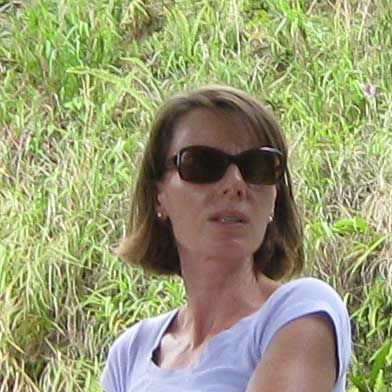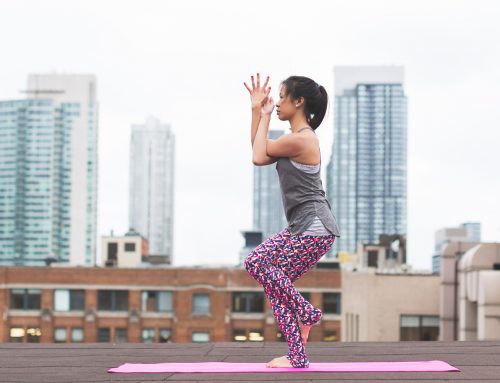Photos and story by Leslie Smith
“We aspire toward the divine nature.”—Shri Yogi Sachinanandaji
AURO VALLEY ASHRAM, RAIWALA, INDIA—
Disembarking into the flat tranquillity of Auro Valley after the vertiginous chaos of Rishikesh 45 minutes away is like stepping out of a crowded subway train directly into a spa. The setting is quietly elegant, almost remote in its other-worldliness of white marbled, elliptical-shaped buildings, neatly tended gardens and, overwhelmingly, peace. Not just peacefulness, but true peace.
The ashram is located near the southern boundaries of the Rajaji Tiger Reserve and wildlife abounds. From the rooftop of the cavernous and echoing residence building, herds of spotted deer can be glimpsed at dawn, tripping through the tall grasses and trees amidst peacocks, green parrots, cattle and other animals. An unseen elephant, whose occasional trumpeting piqued my curiosity, never revealed itself, but large posters on the grounds warned of the incursion not only of pachyderms but tigers; just the week before, an elephant was shooed from the enclave.
Swami Brahmdev is the resident guru of Auro Valley, which he built in memory of the principles espoused by The Mother and Sri Aurobindo, who lived in Pondicherry in the early 20th-century (see http://www.sriaurobindoashram.org/ashram/mother/).

Auro Valley Residence featuring The Mother’s eyes
A hushed and dignified library hosts thousands of books from the philosophical to the entertaining, particularly the works of Sri Aurobindo, who spent much of his life in retreat, writing and thinking, aided by The Mother, an acolyte who took over much of the daily duties of the Pondicherry ashram and became a well-known guru herself, spreading her devotion and wisdom.
The meditation hall features a hypnotic green and white crystal lamp as a central focal point, encouraging silent communion at dawn and dusk. Though the vegetarian food in the dining hall is uninspired, and tightly controlled by Swami Brahmdev’s Russian supporters (he has a big following in eastern Europe and South America), it is at least nourishing. Boris, a huge, affable Russian who visits regularly, offers massages (he speaks little English, but manages to refer to himself gleefully as “Mr. Pain;” others in my group snap up his offer) and also entertains by playing rousing folk tunes from an upper balcony on his accordion.

Boris a.k.a. Mr. Pain playing his accordion
But mostly the ashram is silent and dignified, almost soporific in its inwardness. Mindfulness does not need to be enforced: being in the moment is what it is all about here. I am mindful of Ulysses ten-year-long sojourn in the arms of the goddess Calypso; time passes differently here—and not necessarily quickly. By the end of even a short stay, a feeling of deep relaxation, even lethargy, begins to take hold. Even Boris’s offer of a painfully deep massage begins to seem exciting.
Morning yoga classes are more like a series of 1960s-style calisthenics; the evening class is really a kind of satsang/lecture combo with the enthusiastic Shri Yogi Sachidananda. Satsang with Swami Brahmdev follows breakfast, and then students are pretty much on their own until late afternoon. Unlike some other ashrams, students can come and go as they like but any excursions to Raiwala, Haridwar or Rishikesh must be self-organized. The ashram promotes a Yoga University the ashram promotes, though there was no evidence of it; perhaps it was not the season for it.
What was once a small, circular swimming pool is empty and cracked; the children’s playground slightly overgrown as though the inhabitants left quickly, leaving the mangos and other fruits on the many trees to look after themselves. This benign neglect seems to symbolize the nature of my journey, which had been propelled by a long illness. But sickness overtakes me once again and I cannot find what I seek; malaise hijacks me.
Early in the day, I watch Swami Brahmdev interact with local children, who proudly recite their prayers to him on the ashram porch; they are neatly dressed in uniforms, tiny, wide-eyed and bright as buttons. They scamper off like little monkeys, bright with undone mischief, heading for school. A cow bellows from a nearby farm and the peacocks mew. Somewhere in the distance the elephant trumpets. I look, but I cannot find it.

Children at Auro Valley Ashram
IF YOU GO
Email or call the ashram to reserve a spot. There are flights from Delhi to Dehradrun, near Rishikesh, then it is about a 45 minute drive to the ashram. Buses go to Raiwala, the nearest town three kms away. Trains stop in Haridwar, about 40 minutes away. Taxis can take you to the ashram or arrange to be picked up: http://www.aurovalley.com/visit-us/reservation-guest-student
The Sri Aurobindo Society, which is a separate organization, has guesthouses in Pondicherry as well. Visit http://www.aurosociety.org/visiting/accommodation.aspx for more information.
SATSANG WITH SWAMI BRAHMDEV
During satsang with Swami-ji, sadakhas ask questions pertaining to the meaning of life and the impediments to living fully.
Q: What is an insult?
A: Insults do not really exist. It is Ego which perceives an insult.
Happiness comes from the mind and is impermanent. True contentment comes fm the heart and s the result of consciousness which must be cultivated
Only life can give you the joy of life. Ego tries to confuse and complicate. You must know your own self worth and why you are here on earth…what your purpose in life is.
Ego wants you to become something. Yet you are consciousness. you are the boss. You are the king. Ego can confuse you because you are unsure of yourself. You can confuse the ego . Tell it you are the divine. Am peace. I am love. I am everything. I am the divine. I am that.

The Mother
You confuse it first. You may want to say “I am very beautiful.” But Ego says “no, you are not.” Ego always makes you weak but you are very powerful.
SATSANG WITH SHRI YOGI SACHIDANANDAJI: On Perfecting Meditation
All life is yoga. The basis of yoga is love.
Yoga doesn’t just happen in the morning or in the evening. Yoga happens all day.
Love the divine and it will love you.
Receiving divine love entails so much bliss it is difficult to bear.
Prepare ourselves by opening towards the divine. First we open our minds. The human mind is always blocked by many gates, such as hate, ego, desire, disharmony, greed or anger. This prevents the divine from coming.
When we practise every day we open these gates and we are free. Then the diving enters into our lives.
Change: Every day we observe what blockage is coming, and we remove it. This is the practise of yoga.
Love is knowledge. Love allows the divine to enter.
Next is surrender: Everything comes from the divine. Be grateful to the divine for giving us fruits, cloth, energy, everything we need to live. Remember this with our minds and hearts. This is knowledge. Remember the divine. Surrender to the divine all of your problems, all of your life.
Willpower is a very strong energy within us. Great heroes have willpower behind their actions, that is why they are great. We use our willpower to experience the divine.
Aspiration and will are parallel. You must say, I want this, before you practise. I must know the truth behind human life and if there is a higher life.
Create faith in yourself. Have faith that the divine is within you. Divine is with your always but we do not always experience it. If you believe that the divine is always with you, you will have no problems. Through faith your can see the divine but every day we must practise and have persistence and patience.
Patience is one of the divine qualities. The Divine wants to see how much patience you have.
Practise regularly with sincerity and this is enough. You do not have to have a superior level of yoga practise.
Calm, quiet, peace, and silence are the goals. This why we do yoga and pranayam. If the mind reaches these states then you can know the divine. We must prepare our mind so that when the divine comes it can stay for a few minutes.

Red Bicycle at Auro Valleyle
Many techniques to practise so that the divine can remain within us …concentration, meditation, yamas and niyamas.
A few seconds after pranayam, the mind is completely different. It is at peace. After a few minutes, thinking starts again but in that small period the mind is at peace.
Throughout the day you can then realize that the work you are doing is for the divine.
Wideness, Expansion or Vastness: When you practise yoga you think the whole world is yours. You are vast like the sea. You realize that everything belongs to you. The whole world is one family, and that family belongs to the divine. Your consciousness is a world consciousness.
Equality happens when you reach samadhi. We all are equal. Everyone tries to experience their divine, preparing in their own way and according to their own understanding. If the divine is everywhere then we are all equal.
We only use two percent of our available energy. Yoga can help us tap into this. Energy is also confidence, capacity to face problems and courage.
Our minds are disturbed with so many things. Yoga helps to build a perfect mind so that we can experience the higher nature and higher qualities. We can prepare our minds. Yoga helps to build a higher life. We have to lead our daily lives with the qualities of calmness, equality, vastness, peacefulness, etc. Our lives can then be changed into its higher nature. Yoga means changing life.
We change from the negative, lower nature to the positive, higher nature and experience the divine.
So many people are living like animals. We have to prepare and purify ourselves through exercise – asanas and pranayama. If our body is perfect we can then prepare our minds. The body can help the mind become peaceful.
Meditation: In the beginning, sit in a position you can hold for half an hour. Close eyes is better for concentration. Focus on the breath coming i n and out so that the mind becomes one pointed. You may also choose to believe the breath is coming from the centre of your heart. You may also breathe in and chant or think Om. Breathe out and think Om. Our main goal is to be aware of our consciousness.
If you do not control your horse, he will go anywhere. If you control your horse then he is useful. Otherwise, the horse takes you where it wants to go. When the mind is focussed t is strong and it will not disturb you. We must control our mind and use our mind. When the mind whines the ordinary person listens. Mind is the master. For a yogi, he or she is the master and knows that
“I am not the mind.”
You may also repeat mantras using the mala to concentrate the mind. Any mantra is fine but use your whole concentration to do so. Try to understand the meaning of the mantra and keep it in your consciousness. Om is the centre of energy. If we understand this while meditating on Om, we become the centre of energy.
This is the power of thought.

Rajaji Tiger Reserve
If negative emotions such as anger arise you must separate yourself from it. Say, this is me, and this is my anger. Then anger will begin to dissipate and you can control it. When you practise to develop the higher nature then the lower nature begins to disappear. When you practise love, hate begins to disappear. This is the practise of yoga, to create the higher nature. Always remember the divine is within us. How can I be angry or greedy if the divine is within us?
Yoga is change of consciousness and change of life to establish the divine nature within us. This is enough. This is all we need.
If you live properly life is beautiful. If not life gives you sorrow and depression.
We aspire towards the divine nature.








